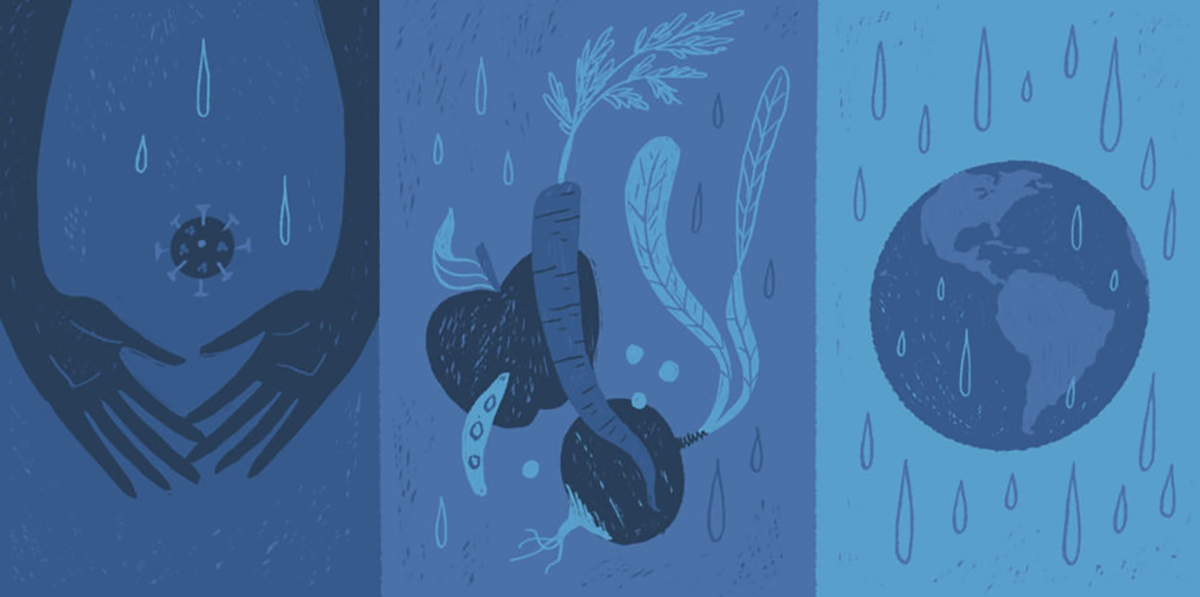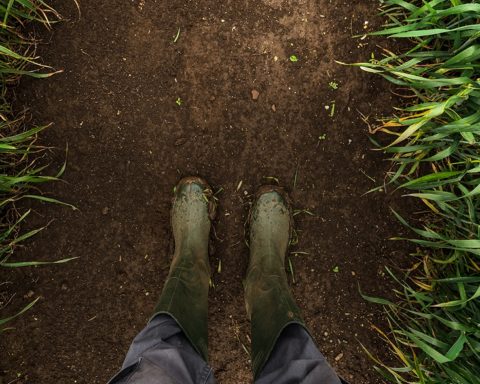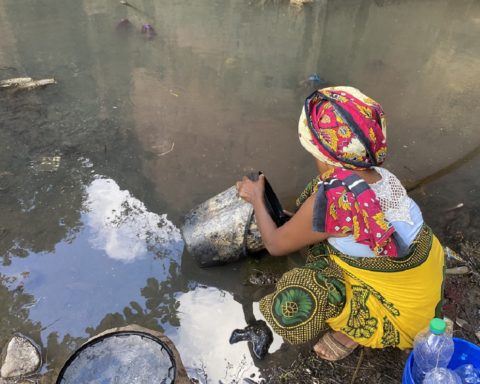L’épidémie de Covid-19 a, comme jamais auparavant, mis en évidence la fragilité des systèmes qui sous-tendent notre monde globalisé, révélant à quelle vitesse ils peuvent s’effilocher avec des effets dévastateurs et de grande portée. Alors que nombreux sont ceux qui dans le monde entier s’efforcent de comprendre les implications de la pandémie, il est clair que l’eau est essentielle non seulement pour ces systèmes, mais aussi pour notre capacité à répondre au Covid-19, et à renforcer la résilience dans un monde post-pandémique.
Si l’humanité doit réellement « reconstruire en mieux » pour prévenir et anticiper les chocs futurs, les gouvernements, les entreprises et la société civile doivent valoriser et investir dans la sécurité de l’eau dans le monde entier.
Un approvisionnement en eau et un assainissement inadéquats privent les communautés de la mesure d’hygiène la plus élémentaire qui contribue à prévenir la propagation des maladies : le lavage des mains. En conséquence, le Covid-19 braque un projecteur impitoyable sur les inégalités, les difficultés et les risques sanitaires mondiaux qui découlent de notre incapacité à faire respecter le droit humain à l’eau et à l’assainissement dans le monde entier.
Besoins immédiats
Dans son rapport de 2019 intitulé « Safer Water, Better Health« , l’Organisation mondiale de la santé (OMS) affirme que l’amélioration de l’eau, de l’assainissement et de l’hygiène pourrait réduire d’au moins 4,6 % les maladies et de 3,3 % les décès dans le monde. Pourtant, les chiffres parlent d’eux-mêmes : 4,2 milliards de personnes n’ont pas accès à un assainissement adéquat et 3 milliards n’ont pas accès aux installations nécessaires pour se laver les mains.
Les spécialistes de santé publique affirment que les infections d’origine hydrique provoquent des maladies diarrhéiques et une mauvaise hygiène bloque l’absorption des nutriments, de sorte que même ceux qui ont accès à des aliments nutritifs peuvent être confrontés à la malnutrition en raison de l’inégalité de l’accès à l’eau. Dans les circonstances actuelles, où le lavage des mains est limité et où les maladies d’origine hydrique sont déjà courantes, la létalité par le Covid-19 pourrait être amplifiée.
Nous devons également être conscients des implications en termes de genre. Dans de nombreuses régions du monde, les femmes et les filles passent des heures chaque jour à aller chercher de l’eau ou à attendre dans des files d’attente bondées les vendeurs d’eau, ce qui peut les exposer au virus. Si elles luttent pour apporter de l’eau parce qu’elles sont malades ou doivent s’occuper de malades, leur santé et leur sécurité alimentaire pourraient être encore plus compromises. Et, pour aggraver le problème, les restrictions de circulation contribuent à réduire encore plus la capacité d’accès à l’eau.
À court terme, les gouvernements et les agences internationales doivent donner la priorité à un approvisionnement en eau et à un assainissement sûrs et fiables. Cela inclut la fourniture d’urgence pour les communautés mal desservies et la protection des personnes chargées d’aller chercher de l’eau contre l’exposition au virus. Nous devons également mieux comprendre où et comment les infrastructures municipales ou rurales d’approvisionnement en eau font face aux pics de demande dus au virus, afin de pouvoir les gérer correctement pour éviter les pénuries, susceptibles de toucher les plus vulnérables.
Menaces à moyen terme
Dans l’effort de lutte contre la pandémie, l’une des priorités les plus importantes sera d’assurer l’approvisionnement en eau d’irrigation des exploitations agricoles qui ont peut-être manqué une saison de plantation, sans compromettre les besoins en eau domestique de base, tout en atténuant les risques de sécheresse, d’inondations et d’autres phénomènes météorologiques extrêmes. Pour ce faire, la gestion de l’eau devra renforcer la stabilité des systèmes alimentaires tout en tenant compte de la perspective de chocs superposés, tant naturels qu’anthropiques, qui exerceront une pression supplémentaire sur la production alimentaire.
Les risques liés à l’eau pour les systèmes alimentaires et les économies en général se dissimulent dans des endroits où, pour contrer les déficits de l’approvisionnement alimentaire, les cultures de saison sèche se développent et la demande d’eau pour l’irrigation augmente, tout comme la demande d’eau pour la réouverture des économies et des villes.
Les inondations et la sécheresse ne seront pas mises en pause pendant la pandémie. Lorsque des personnes sont déplacées par de telles catastrophes naturelles, les autorités établissent souvent des camps ou des abris surpeuplés, ce qui n’est manifestement pas une option viable à l’heure actuelle. Heureusement, nous pouvons surveiller et anticiper les risques liés à l’eau, et les autorités peuvent utiliser les données qui en résultent pour aider à la reprise et mettre en place des mécanismes aptes à soutenir les personnes pauvres et vulnérables en temps de crise.
La perspective de chocs concomitants plus importants est une autre préoccupation. En janvier, le Forum économique mondial a publié son rapport annuel sur les risques mondiaux, qui classe les risques liés à l’eau, aux maladies infectieuses et aux questions de sécurité alimentaire. En 2020, il y aura probablement des endroits où nous constaterons les trois risques à la fois.
Pour éviter que les risques liés à l’eau n’aggravent le défi de la sortie de la pandémie par des mauvaises récoltes, une concurrence non maîtrisée pour l’eau ou des sécheresses ou des inondations imprévues, les pays devront renforcer la gouvernance de l’eau. Cela permettra d’assurer un approvisionnement fiable en eau pour les utilisations prioritaires telles que l’agriculture, la santé publique et l’industrie. Ils devront également améliorer le stockage de l’eau et la capacité d’irrigation pour compenser les perturbations des cycles agricoles pluviaux, et renforcer les stratégies de gestion des risques de sécheresse et d’inondation pour protéger les agriculteurs, les communautés et les économies contre les multiples chocs simultanés du système alimentaire.
Reconstruire en mieux
Dans l’ère post-pandémique, nous devons utiliser ce que nous apprenons sur la dynamique des systèmes mondiaux interconnectés pour « reconstruire en mieux ». Les secteurs public et privé doivent investir dans l’eau afin de créer une plus grande résistance aux chocs climatiques, sanitaires et alimentaires, et d’améliorer la gestion des risques liés à l’eau.
Cela signifie, entre autres, qu’il faut réclamer des systèmes d’eau plus circulaires, qui garantissent l’approvisionnement et qui permettent de mieux capter, nettoyer et réutiliser les ressources de manière à protéger la santé des hommes et des écosystèmes. Cela signifie qu’il faut réimaginer nos flux de déchets comme des flux de ressources, de sorte qu’au lieu de rejeter 80 % des eaux usées du monde dans l’environnement sans traitement, nous investissions dans un traitement qui protégera nos communautés et nos écosystèmes contre les risques biologiques et recyclera en même temps, en toute sécurité, l’eau, l’énergie et les nutriments. Bien qu’il n’y ait actuellement aucune preuve tangible que le Covid-19 puisse se propager par l’eau ou les eaux usées, nous savons que des épidémies historiques ont été transmises de cette manière et que les eaux usées non traitées restent aujourd’hui un danger pour la santé dans trop de communautés.
Nous entendons déjà des appels en faveur d’une plus grande autosuffisance alimentaire, car les gens subissent des perturbations dans le commerce et le transport des denrées alimentaires. Dans certains cas, cela peut permettre une plus grande résilience, en raccourcissant les chaînes d’approvisionnement et en protégeant les nations contre les changements de politiques agricoles et alimentaires des partenaires commerciaux.
Mais des chaînes d’approvisionnement plus courtes pourraient également accroître les vulnérabilités, par exemple aux sécheresses, aux inondations et aux maladies des cultures. En outre, l’autosuffisance alimentaire peut entraîner une utilisation non durable de l’eau, car les stratégies d’importation de denrées alimentaires sont souvent motivées par un approvisionnement en eau insuffisant pour la production locale. Si l' »eau virtuelle » intégrée dans les importations alimentaires est remplacée par une utilisation locale non durable de l’eau, la disponibilité de l’eau pour la boisson, l’agriculture, les écosystèmes et toute une série d’autres utilisations urgentes pourrait être compromise.
Aujourd’hui, nous devons nous tourner vers l’avenir avec une nouvelle appréciation plus profonde de la valeur de la résilience et des systèmes complexes, interconnectés et interdépendants, qui régissent nos vies et l’économie. À partir de maintenant, nous devrons faire preuve d’un esprit systémique, et non d’un esprit unique.
Il est essentiel de ne pas perdre de vue que l’eau relie la santé, les systèmes alimentaires, le changement climatique, la nature, l’énergie et les finances. Le tissu de la sécurité de l’eau est créé en tressant ensemble une gouvernance efficace, des connaissances et des compétences, la connectivité entre les systèmes, ainsi que l’investissement dans les infrastructures, les technologies et les services des écosystèmes et leur application. Si nous voulons prospérer dans le monde post-pandémique, nous devons travailler dès maintenant à renforcer chacune de ces composantes et veiller à ce qu’elles soient utilisées de concert pour renforcer la résilience.
Claudia Sadoff, Directrice générale de l’Institut international de gestion de l’eau (International Water Management Institute) et Mark Smith, directeur général adjoint, Institut international de gestion de l’eau.
Le texte original (en anglais) de cette tribune a été publié par Ensia
Image d’en-tête : Illustration Kelsey King/Ensia













L’eau est un bien commun de l’humanité et n’a pas être privatisée.Il est pour le moins scandaleux, voire criminel que des entreprises privées se fassent de l’argent sur un bien vital pour tous les humains. Il faut qu’une instance internationale interdise cette privatisation et la vente d’eau en bouteilles et qu’elle contraigne les états à fournir de l’eau potable à tous ses citoyens. Je considère que tout autre discours ou mesurette relève d’un comportement irresponsable et coupable d’atteinte à la vie des humains.
Bernadette Oriet – Canton du Jura- Suisse